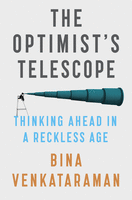
A friend once caught the fever of counting her steps. She was taking part in a workplace fitness competition, in the hope that it would cajole her into getting healthier. Her company doled out Fitbits — those digital schoolmarms that ceaselessly track their wearer’s every move — to teams of employees who competed against each other.
One day I ran into her and asked her how she was faring. She had found her team lagging behind the others, so she added a short afternoon walk to her daily routine. But she confessed that her walks to ratchet up her number of steps took her past a delicious bakery, where she invariably bought a pastry or two that she gobbled down on her way back to the office. Her focus on a measure of progress, the number of steps she took each day, had overtaken the goal of actually getting healthier.
By 2020, we’ll have tens of billions of sensors on Earth, allowing us to mince and measure yet more of our everyday actions. Technologists are calling data, in turns, the oil and the electricity of the 21st century. Athletes already chart their resting heart rates. The unhappy track their momentary mood changes. Parents monitor their babies’ diaper dampness.
The upside of so much measuring is that it lets us see where we stand. High temperature readings, for instance, tell us when to take Tylenol or call the doctor. Tracking the miles you’ve driven each hour helps you figure out whether you’re on pace to reach your destination. We take stock of earnings, page views and test scores so we can strive to improve them, to win at the game of life. It all seems helpful, or at least harmless.

But hitting a near-term target can become a damaging obsession. We often set such targets based on what we can easily measure, calling them metrics. But the data points align with what we see in front of us. In other words, they reinforce the availability bias — our tendency to take most seriously what we can take in now with our senses. We believe that numbers are objective — that they don’t lie. At times, however, close-range measures outright deceive us.
I shivered through record-breaking cold days while living in Washington, D.C., in the winter of 2014, when icy Arctic winds were unleashed from the “polar vortex.” But the thermometer readings belied that it was then the warmest year ever recorded on the planet. Temporary dips in gas prices the following year sent Americans on buying sprees for SUVs, condemning them to higher expenses when prices would rise again. Getting $2,000 as a tax credit for having children can make people feel that a tax policy, such as that passed in the U.S. in December 2017, is a good idea, even if that same policy makes it more difficult for the middle class to buy homes, pay off debts and go to college — denying them far greater wealth over time. The check we get this year, and the uptick of our bank balances, is a blindfold, more salient than the overall eventual loss we’ll experience from the tax reforms.
I call this problem dashboard driving: when we careen forward, glued to gauges of speed or fuel levels, not realizing meanwhile that we may be steering off a cliff. We can’t blame human nature alone for our tendency to favor the present and neglect the future; it’s also the tools we choose to use, our ostensible measures of progress.
The upside of this insight is that we do have a choice. There are three ways we can avoid the dangers of myopic measures in an era of data overload.
Look at long-term—not just immediate—measures.
When buying a house, for example, we might focus less on calculating near-term payments and more on the potential costs over the decades we expect to live in the home. When it comes to fitness, we might choose to measure what most closely aligns with the outcomes we want, whether it’s minutes we can spend walking briskly or the mountain whose summit we can now reach.
Imagine the future.
In the 1980s, Wharton Professor Deborah Mitchell coined the phrase “prospective hindsight” to describe a practice that’s relevant today for tuning out short-term noise: Imagine a future outcome — a successful or failed dinner party for example — and then come up, in advance, with all the reasons why it might have “happened.” This clarifies which decisions are pivotal to the outcome you want (perhaps the mix of guests or the conversation topics you have prepared) and what might be trivial (maybe the weather forecast or any one person’s RSVP status).
Orient to your North Star.
Aristotle argued that a life ought not to be measured in small increments but viewed from a long perspective. This outlook expands our patience for endeavors like learning a new language or raising a child, which take a long time to bear fruit. It’s worth reminding ourselves what our ultimate goals are and asking whether we’re making progress toward those goals frequently. A monthly or bimonthly ritual of reflection is one way to address this. What do you want to be remembered for, and have you made real progress — or just amassed more points in the game of life?
From The Optimist’s Telescope by Bina Venkataraman. Published by arrangement with Riverhead, a member of Penguin Random House LLC. Copyright © 2019 by Bina Venkataraman.
More Must-Reads from TIME
- Cybersecurity Experts Are Sounding the Alarm on DOGE
- Meet the 2025 Women of the Year
- The Harsh Truth About Disability Inclusion
- Why Do More Young Adults Have Cancer?
- Colman Domingo Leads With Radical Love
- How to Get Better at Doing Things Alone
- Michelle Zauner Stares Down the Darkness
Contact us at letters@time.com